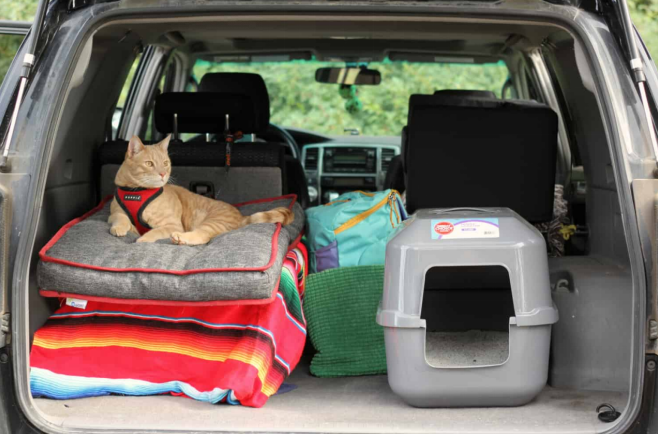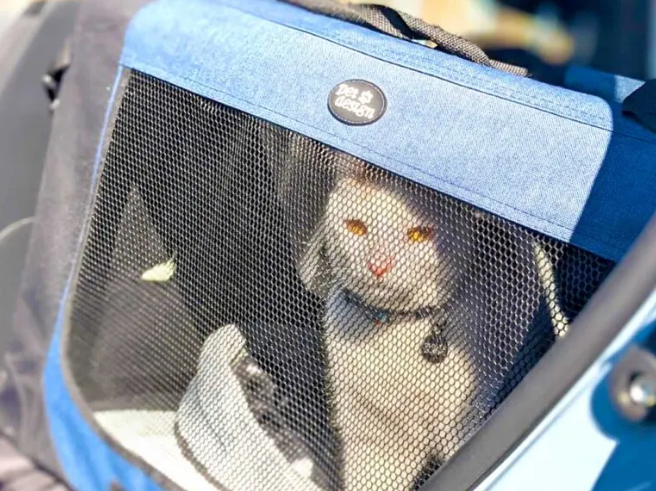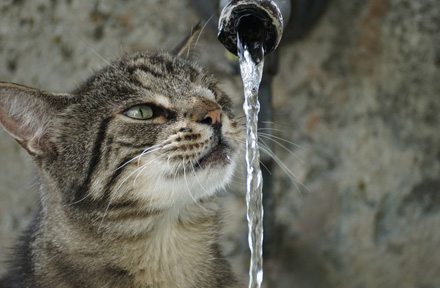Aug 14, 2025
Author:Sam Wonder

It is not always easy to travel with your cat. What is one of the greatest challenges? Finding a hotel that accepts cats as guests. You would like a hotel that is safe and comfortable for both of you, but not all hotels are cat-friendly.
Some hotels allow cats, and others have a no-pet policy. It is a good idea, therefore, to conduct some extra research before booking. It’s not just about location or price anymore—it’s about making sure your cat is welcome too.
Not all hotels are cat-friendly, and the policies are different depending on the brand, location, and even the decision of the management. Some hotels claim to be pet-friendly, and when you go there, they are only dog-friendly. This is the reason why some questions should be asked before booking.
When you want to check the pet policy of a hotel, you should ask the following: The issue of
● whether cats are permitted or not
● If there are size or breed restrictions
● What the pet fee covers
● Any special rules like leash or carrier requirements
More luxurious chains can have higher deposits or pet amenities, whereas low-cost hotels can just accept pets without additional features. It is also advisable to inquire how the hotel deals with messes caused by pets in case of accidents.
If you're traveling with your cat for the first time, make sure to brush up on travel safety tips and get your cat used to new environments slowly.
Most hotels do not want to accommodate cats because of some general issues:
● Allergies: Cat dander may persist long after checkout, and this may be a problem to future guests.
● Scratching & Hiding: Cats can scratch furniture or hide in places that are difficult to reach.
● Litter Box Requirements: A litter box setup is required, which some hotel employees find difficult to handle.
Due to these factors, hotels occasionally want to restrict pet stays to dogs. However, most chains are discovering that cats can travel, particularly when owners do the right things.
To keep things simple, always call ahead and confirm, even if the website says pets are allowed.
The preparation begins at home. Routine is important to cats, and any interruption of this, such as travel, can cause anxiety or even disease. Slowly acclimatize them to their carrier by putting treats or old bedding in it. They can also adjust to short practice trips in the car.
Once you finally decide to travel, think of the duration of the trip. It is not true that every cat reacts to long stretches of movement in the same manner, and it is better to understand whether cats can travel long distances or not before deciding to go on a long journey by road.

Your best option is to search through travel sites or pet-friendly booking sites where you can filter them to be cat-friendly. However, even at that, the policies can differ depending on the location. One chain can permit cats at some locations and not at others.
Make a list of places you would like to stay, then call or email. When contacting, make it clear that you are traveling with a cat, and inquire about any fees, regulations or documentation. That initial push can save you a headache in the future.
Hotels can offer services to people, but your cat will require its own travel kit. In addition to food and litter, do not forget to take things that will be comforting, such as their favorite blanket or a familiar toy.
● Portable litter box and litter
● Food and water dishes
● Blanket and favorite toys
● Snacks and dry food
● Carrier and harness
And do not forget a first aid kit for pets. The list of what to carry in a pet first aid kit can help you handle minor road emergencies without panic.

Regular feeding patterns for your cat are important even during a journey. Travel delays are already stressful enough, and maintaining their routine as much as possible will make them feel safe. When you are not at home, this guide on how frequently you have to feed your cat may be useful.
And don't forget to hydrate! A lot of cats are likely to drink less during travel. To avoid problems such as urinary tract infection or constipation, use a portable fountain or bowl, as well as some hydration tips.
Once you arrive, take a few minutes to “cat-proof” the space. Cats are fond of hiding and will fit into the smallest holes, under the bed, behind the furniture, or into open drawers. Before you allow your cat to roam, use these easy cat-proofing measures to seal off dangerous zones.
In that case, the room is too large or new, you can confine your cat to a single area of the room by using their carrier or a travel crate as a safe place. They will be able to explore more as they adapt.
Hotel rooms are not cat-friendly. Windows may be open, cleaning materials, or cords, which are a safety hazard. It is important to monitor your pet, especially in the initial few hours. You may even consider hanging a Do Not Disturb sign on the door to avoid any surprises from the housekeeping staff and allow your cat to run away.
If you are traveling in warmer months, be careful. In new surroundings, cats are likely to overheat easily. These are some of the summer safety tips that can make you aware of heat-related hazards and keep your pet happy and healthy.

If your cat has a feeding routine, adhere to it, which will lessen the stress and maintain consistency. The most appropriate one is the automatic pet feeder, especially when you are away and you spend much time sightseeing or attending concerts. It is a mini gadget that will enable your cat not to go without eating even when you are not around. It is not just convenient, but it can also save the routine of your cat and make it feel safer in a strange place.
Traveling with a senior cat brings even more considerations. Old cats are more susceptible to environmental and routine changes and may require additional comfort, medication or more attention. This senior cat care guide will provide some useful information on how to prepare your older pet to travel.
You may have to ask for a quieter hotel room, bring special bedding, or make sure that any stairs or steps are not a problem for them.
When planning to stay at a hotel as part of a long road trip, you may be wondering how your cat will cope with the long travel. Some cats can accustomed to it as time goes by, and others might be overwhelmed.
Whether you are flying or driving, understanding how cats deal with long-distance travel can help you plan better and determine whether it is worthwhile to stay at hotels on the way.
● Ensure that your cat is microchipped and has a collar with a visible ID tag.
● Have the vaccination records at hand just in case you might require them during check-ins or emergencies.
● Carry disposable litter trays- they are small and convenient to carry around.
● Place a soft towel in the carrier of your cat to make it more comfortable during the trip.
● Keep calm and relaxed-your cat will feed off your energy, so by remaining steady, your cat will remain calm.
Traveling with pets tips can assist you in planning a safe and stress-free trip.
So, do hotels allow cats? Yes, traveling with a cat may take extra planning, but it’s possible and can even deepen your bond with your pet. With the right preparation, you’ll find that your feline friend can be a surprisingly adaptable travel buddy.
Keep their routine as consistent as possible and provide comfort, safety, and care every step of the way. Whether it’s choosing the right hotel, packing smart, or calming nerves on the go, each step makes a difference.
Label:
Popular Post

What to Feed a Sick Dog With No Appetite? [2025 Guide]
May 16, 2023

Troubleshooting Common Issues with Automatic Pet Feeders: Tips & Tricks for Pet Owners
Oct 26, 2023

What is a standard Cat Weight chart by age Kg?
Mar 19, 2025

Why Does My Cat Cough After Drinking Water? 8 Potential Reasons
Mar 13, 2023

Why is My Cat Throwing up Water? Top 5 Causes Here
Feb 08, 2023
$109.99
$129.99
Copyright © 2025 WOPET. All Rights Reserved.